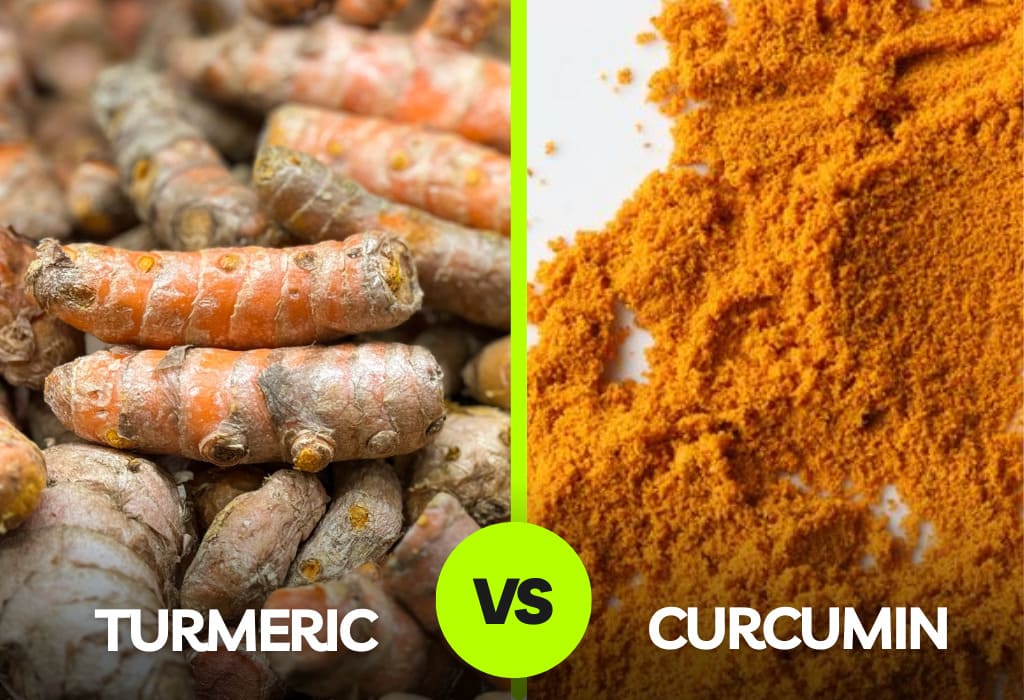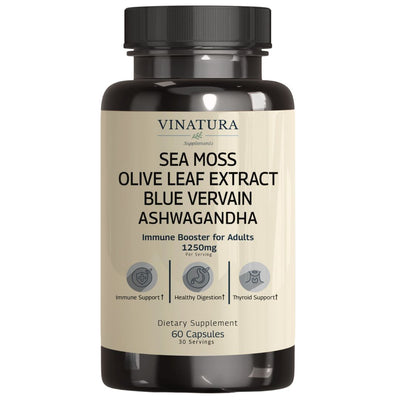
Turmeric Vs Curcumin: What Are Differences Between Them?
Turmeric and curcumin are closely related but not the same. Turmeric is the whole root commonly used in cooking and traditional medicine, while curcumin is its most active compound, extracted for stronger antioxidant and anti-inflammatory effects. This article explains their differences in origin, benefits, forms, absorption, and usage.
Before exploring further, please read the disclaimer located at the end of this webpage.
Key Takeaways
- Turmeric has curcumin extract but the content is not high, only 2 - 9%.
- Not everyone can absorb curcumin from turmeric, but must use concentrated curcumin extract.
- You can easily distinguish turmeric and curcumin through the criteria of origin, form of existence, price, absorption capacity, ...
- You should contact your doctor or nutritionist to be prescribed the appropriate type to use.
Turmeric Vs Curcumin: What’s Differences Between Them?

Many people are confused about whether to use turmeric as an anti-inflammatory supplement or to use curcumin directly. Below is a detailed comparison so you can make the decision that is right for your health condition:
Origins
Turmeric is a spice derived from the root of the Curcuma Longa plant, native to Southeast Asia (mostly in India) [2]. You can easily recognize turmeric by its prominent yellow, brownish-yellow or reddish-yellow color - coming from the active ingredient curcuminoid, a light aroma and somewhat similar to ginger but with a darker color.
Many years ago (~4,000 years ago), this root was widely used in traditional medicine to help reduce inflammation in the skin or limit uncomfortable symptoms when suffering from digestive problems thanks to containing more than 200 different antioxidant/anti-inflammatory compounds [1, 2].
Curcumin is a powerful bioactive compound (natural anti-inflammatory) found in turmeric (mainly ground turmeric or extracted into a solution), belonging to the curcuminoid group and contributing to the yellow color of turmeric.
Research shows that 2 - 9% curcumin is found in turmeric. Curcumin was first known for its antibacterial properties when it was isolated by researchers in the early 20th century and first demonstrated in 1949 [3].
Read more: What Foods Have Curcumin? Ways to Supply Curcumin
Forms
Turmeric is a root, harvested and ground into a yellow powder, used as a spice to season dishes. Curcumin is an extract found in turmeric, mainly in the root and prepared in the form of capsules/tablets, powder, solution, etc. (depending on the manufacturer's choice).
The main uses of curcumin are anti-inflammatory and antioxidant to protect the body from harmful factors, improve concentration and support metabolic activities in the body.
Turmeric contains curcumin but in very small amounts. Therefore, many manufacturers proactively extract curcumin from turmeric to increase the content of this extract, thereby giving faster results than just using turmeric as a daily spice.
Benefits
Turmeric is often used to create beautiful colors and attractive aromas for dishes, while still providing antioxidants and anti-inflammatory substances for the body.
In particular, turmeric has the ability to resist fungi that are harmful to the body, but this benefit is not found in curcumin (because it comes from the active ingredient curdione in turmeric).
In addition, with its powerful antioxidant, anti-inflammatory and antibacterial properties, turmeric also supports the mechanism against the growth of harmful tumors that curcumin cannot do.
This has been agreed by Anup Sharma - a user on Quora platform also share similar things/ have similar opinions that when turmeric contains many types of antioxidants*, not just curcumin, so why not use it?
Meanwhile, curcumin is commonly used to help reduce discomfort associated with joint-related issues, improving eyesight, increasing kidney health and filtering capacity, limiting allergies from dirt (such as sneezing, runny nose, stuffy nose, ...) Most notably, curcumin has the ability to maintain stable blood sugar levels,... [1, 4, 5]

Absorption
The absorption capacity of turmeric when entering the body is different for each person, but when used with pepper and healthy fats (such as coconut oil, olive oil, butter, etc.), it can be significantly improved. And of course, not everyone can absorb curcumin in turmeric.
At the same time, curcumin is poorly absorbed when entering the body because it is easily dissolved in water and metabolized, quickly excreted through the liver.
You can take advantage of the absorption capacity of turmeric, add black pepper and healthy fats when using curcumin to improve up to 2000%. In addition, turmeric and curcumin can be better absorbed when heated, that is, through cooking [1].
Availability
Turmeric is available in many forms such as fresh roots, ground powder,... and is easily found in supermarkets, convenience stores, grocery stores,... Curcumin exists in the form of capsules/tablets, powder, solution,... and can be purchased on e-commerce platforms, official websites of manufacturers, pharmacies,...
Price
Turmeric is usually cheaper than curcumin extract. On average, the price of turmeric starts at around $2/kg, while curcumin extract products typically cost from $10 and up. Of course, these are just reference prices, which can vary depending on factors like the raw material source, supplier brand, or distributor.
Given its affordability and vibrant color, turmeric is often preferred for culinary use. As Robert Gumpert mentioned, turmeric works better in cooking because of its attractive hue and low cost—qualities that curcumin extract doesn’t offer.*
Risks and Side Effects
Turmeric is not an allergenic spice, but some people find the smell of turmeric unpleasant and cannot eat it. In addition, some people also experience diarrhea, dizziness, headaches, etc., but this is not very common, only appearing when using >3mg/kg of body weight. Similarly, curcumin extract also has the same symptoms as turmeric when used in overdose (>2000 mg/day) [4].
Below is a summary of information comparing turmeric and curcumin for your easy reference:
|
Aspect |
Turmeric |
Curcumin |
|
Origins |
A spice derived from the root of Curcuma longa, native to Southeast Asia, especially India. |
A bioactive compound found in turmeric (2–9%), first isolated and studied in the early 20th century. |
|
Forms and Uses |
Used as a whole root or ground into a yellow powder for cooking; common in traditional medicine. |
Extracted from turmeric and formulated into capsules, powders, or liquids for supplementation. |
|
Main Benefits |
Adds color and aroma to food; provides antioxidant and anti-inflammatory effects; has antifungal properties due to curdione; may support healthy cell function. |
Primarily used for reducing inflammation, improving kidney function, vision, blood sugar regulation, and allergy relief. |
|
Absorption |
Varies by individual; enhanced when consumed with black pepper and healthy fats (like coconut oil); cooking improves absorption. |
Poorly absorbed alone; absorption can be increased by up to 2000% with black pepper (piperine) and fats. |
|
Availability |
Widely available as fresh root or powder in supermarkets, groceries, and convenience stores. |
Available as capsules, tablets, powders, or liquids via pharmacies, official websites, and online marketplaces. |
|
Price |
Generally cheaper; around $2 per kg. |
More expensive; typically starts at $10 per product, depending on brand and formulation. |
|
Risks and Side Effects |
Generally safe, though some may find the smell unpleasant or experience mild side effects (e.g., diarrhea, dizziness) if consuming >3mg/kg of body weight. |
Similar to turmeric; excessive intake (>2000 mg/day) may cause side effects such as headaches, diarrhea, etc. |
Should You Choose Turmeric or Curcumin Extract?
The choice of turmeric or curcumin extract from turmeric is related to the purpose of use. In particular, curcumin is a stronger antioxidant extract than regular turmeric, so if you want to help overcome a certain health problem, curcumin is of course a great choice.
But if you just want to improve your general health, you can just use turmeric for cooking. However, to know exactly, you should consult your doctor for accurate advice.
Currently, the trend of users is to prioritize using functional foods in capsule/tablet or powder form containing curcumin. Because the entire process of raw material processing and production is supervised by experts as well as finished products are inspected by a third party before being released to the market.
And of course, users can easily find and buy the best curcumin supplements when needed on the official brand website or the Amazon e-commerce platform.
Andy Lee is one of the customers who had a good experience using curcumin supplements. Specifically, he shared on Quora that he used turmeric/curcumin capsules plus black pepper (anti-inflammatory) 1,800 mg per day.
The results were quite positive when his knee pain was reduced and he could function normally. Or Ola Ag used a powdered curcumin product and claimed "A good quality pill for your aches and pains." on Amazon.*
Conclusion
Above is a comparison of turmeric and curcumin. Hopefully, users can easily distinguish between these two substances. In general, turmeric contains many different antioxidants, while curcumin is just an extract found in turmeric. Therefore, depending on your needs and advice from your doctor or nutritionist, you can choose the product that is suitable for your health condition.
Testimonial Disclaimer
*The testimonials presented on this website are provided by individuals based on their personal experiences with our products. These testimonials represent individual opinions and experiences, which may not be typical or applicable to all users of our products. Results may vary depending on a variety of factors, including individual health, lifestyle, and adherence to product usage instructions.References
- [1] O’Brien, S. (2018, July 12). Turmeric vs Curcumin: Which Should You Take? Retrieved May 11, 2025, from Healthline website: https://www.healthline.com/nutrition/turmeric-vs-curcumin.
- [2] Naghsh, N., Musazadeh, V., Nikpayam, O., Kavyani, Z., Moridpour, A. H., Golandam, F., … Ostadrahimi, A. (2023). Profiling Inflammatory Biomarkers following Curcumin Supplementation: An Umbrella Meta‐Analysis of Randomized Clinical Trials. Evidence-Based Complementary and Alternative Medicine, 2023(1). https://doi.org/10.1155/2023/4875636.
- [3] WebMD Editorial Contributor. (2020, September 24). Health Benefits of Curcumin. Retrieved May 11, 2025, from WebMD website: https://www.webmd.com/diet/health-benefits-curcumin.
- [4] Meixner, M. (2018, June 11). Turmeric Dosage: How Much Should You Take Per Day? Retrieved May 11, 2025, from Healthline website: https://www.healthline.com/nutrition/turmeric-dosage.
- [5] Prasad, S., & Aggarwal, B. B. (2025). Turmeric, the Golden Spice. Retrieved May 11, 2025, from Nih.gov website: https://www.ncbi.nlm.nih.gov/books/NBK92752.
Author

Product Disclaimer
Including an ingredient or study does not evaluate, endorse, or recommend any Vinatura product or any third-party product. Some ingredients discussed may not be used in any Vinatura product.
The content of the articles has not been evaluated by the Food and Drug Administration (FDA) and is not intended to promote or endorse any specific product. Any products sold on this website are not intended to diagnose, treat, cure, or prevent any disease.
Opinions and Endorsements
Any claims, statements, or opinions expressed in the articles are those of the author(s) and do not necessarily reflect the views or opinions of the manufacturers of the dietary supplement products. The products sold on this website are separate from the content of the articles and are not directly endorsed or associated with the information presented here.
Liability Disclaimer
The author(s) of the articles, website, and manufacturers of the dietary supplement products do not assume any liability for any potential consequences arising from the use of the information provided in the articles. Ingredient effects, dosages, and safety vary by individual, formulation, and context; some ingredients interact with medications or may be unsuitable during pregnancy or lactation. It is recommended that individuals consult with a qualified healthcare professional before making any dietary or lifestyle changes, including the use of dietary supplements.
Product Usage
Please refer to the product labels and packaging for specific usage instructions and guidelines for the dietary supplement products sold on this website.
Customer Support
For any concerns or questions regarding the dietary supplement products, please contact our customer support team, who will be more than happy to assist you.





Leave a Comment
Be the first to comment.
What do you think?